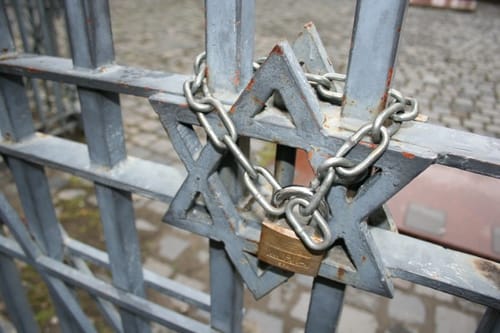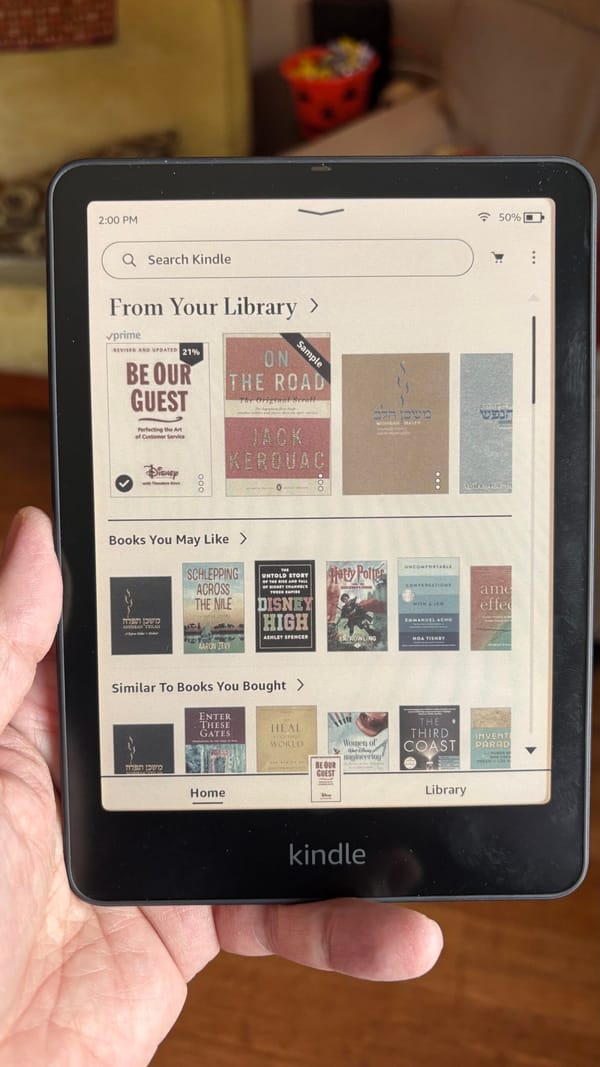Rock, Paper, Scissors, Synagogue
When I left New York, I promised myself I would not support the creation of the same type of useless security measures that ultimately devoured my hometown. And now my synagogue wants to create one.

Very early in his controversial criticism of the Jewish status quo, Gonzo Judaism, Rabbi Niles Goldstein asks:
"Who in their right mind would want to be part of a religious community whose motto, based on its past behavior, might as well be 'Come Survive with Us?'"
He was talking about the same hackneyed themes I've complained about before. (For example, read my previous criticisms on these same grounds of the World Union for Progressive Judaism and Chicago's own Spertus Institute.) The themes repeatedly trotted out by denominational Jewish leaders that define Jewish identity in the starkest of term. Essentially, that we are a people stiff-necked enough to not be completely eradicated every time someone wants to kill us--and that we should remain stiff-necked, since people will always want to kill us.
Hey, who else wants to be a Jewish convert? See how much fun it is?
There are so many other loving, positive, celebratory ways to define Judaism and live Jewish lives, but the above sentiments never go away. A big part of the reason why is that many Jews won't let them.
My synagogue rents space on our second floor to a major inter-denominational day school. This week, our e-bulletin announced that in the wake of the Newtown school shootings, at the request of our school tenant, no one would be allowed in the building during the week unless they stopped at a guard station, had specific businesses in the building, showed identification, and wore at all times a "Visitor" badge around their neck.
Let's unpack that.
First of all, what are synagogues if not the spiritual homes of the people who attend them. Not to mention the potential future spiritual homes of the people who seek them out. Say you're a total stranger known by no one and you show up at the synagogue's front door. Sorry, you don't have an appointment. Call ahead next time and maybe you'll be able to walk inside and actually, you know, see the sanctuary. Now pretend you're a longtime member, regularly attend Shabbat services, everyone knows you, and not for nothing, your membership dues help employ the clergy and keep the lights on. You want whom to show I.D. and wear a sign around their neck?
In either instance, your synagogue has just gone from being welcoming to hiding behind a drawbridge--and sending a needlessly insulting message to members, to boot.
Is security an important issue? Absolutely, and not just in the Jewish community either. But you have to ask what kind of security? And how do you roll it out? And before those questions you also have to ask something else: Why?
When I left New York City in 2003, I had spent the previous year and a half watching post-9/11 Gotham pull up many a drawbridge. From architecturally significant skyscraper lobbies to the doors of neighborhood houses of worship, from entire streets to the front door of City Hall, all increasingly became off-limits to the public because of security fears. Sometimes an I.D. check and metal detector or pat down would get you in formerly completely public spaces. Other times, beloved places were just off-limits for good.
Public areas that weren't off limits became clamped down in other ways. Imagine squads of machine gun-toting police officers stationed in Daley Plaza, rifle-wearing National Guardsmen standing around every corner of Union Station? Surprise bag searches to get on the 'L', and ominous anti-terrorism messages played between every station? Now change those places to Times Square, Grand Central Terminal, and the NYC subway and not only will you have a good idea of my bad memories from those last few months in New York, you'll also have a good picture of the way things still are in my hometown.
When I came to Chicago, one of the most soul-affirming aspect of this place (and if you live in this wonderful place, you already know there are many such soul-affirming parts of the Chicago experience) was the absence of a city living its life in utter fear. So you can imagine the mood-destroying shock I was in when I read the email announcing the new security changes during Ryan's and my two-year anniversary dinner last night.
It is normal to desire security and safety. It is a good thing to seek to protect our families and our congregations. (And, yes, a congregation that also rents space from us was a target of the foiled 2010 Yemeni mail bomb plot.) But this endless zeal for erecting higher and higher security fences around our public places--synagogues or anywhere else--tends to have the opposite effect of the one intended. It chokes off an important, open, welcoming attitude both towards people whom we don't know and people whom we do. It makes it harder for us to reach out for each other. And it makes it harder to reach back.
But unfortunately, it usually doesn't make us any safer. Because when you think about it--which, during moments of fear we rarely do--machine gun squads, armed Guardsmen, locked doors at the Woolworth Building lobby, and bag checks on the subway have absolutely no ability to stop airplanes from being flown into skyscrapers. Which is why all those security measures came to be in the first place.
Now a madman has senselessly murdered innocent children and we rightly want to protect our own kids from a similar incident. But if you followed the Newtown story, you already know that the killer entered the school by shooting away the front door with an assault rifle. Which is why we want to...roll out a mandatory card check and visitor badge?
Do I really have to rock-paper-scissors that for anyone?
Result? Our synagogue becomes less welcoming thanks to a security measure that has no hope of stopping the type of crime that we're afraid of in the first place.
When I left New York, I promised myself I would not support the creation of the same type of knee-jerk and ultimately useless security measures that ate away at and ultimately devoured my hometown. I announced on Facebook last night that I wouldn't be renewing my synagogue membership as long as the new policy is in place. It caused great consternation among my friends in the congregation and enormous unhappiness between me and Ryan. But it's a promise I've abided by for ten years.
And if you want me to pay $2,400 a year for the privilege of having a moonlighting Chicago cop decide whether or not I'm allowed to have access to my spiritual home, it would help if the privilege actually fit the crime.




